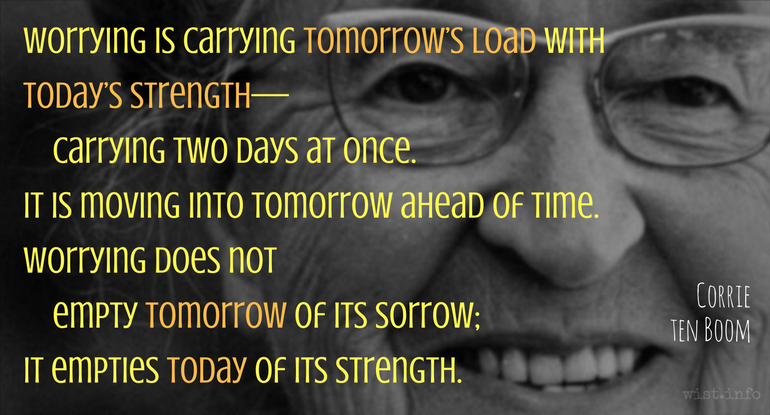Know the true value of time; snatch, seize, and enjoy every moment of it. No idleness, no laziness, no procrastination: never put off till to-morrow what you can do to-day.
Lord Chesterfield (1694-1773) English statesman, wit [Philip Dormer Stanhope]
Letter (1749-12-26) to his son (#211)
(Source)
Chesterfield either loves the "Never put off" phrase or is very familiar with it: he repeats it a few months later in Letter 216 (1750-02-05), and then a few years later in Letter 309 (1754-02-26).
See Fuller and Franklin.
Quotations about:
today
Note not all quotations have been tagged, so Search may find additional quotes on this topic.
Never leave that till tomorrow which you can do today.
Benjamin Franklin (1706-1790) American statesman, scientist, philosopher, aphorist
“The Way to Wealth” (1758)
(Source)
Today, this is more commonly given as "Never put off till tomorrow what you can do today."
Franklin had used a different phrasing in Poor Richard (1742 ed.): "Have you somewhat to do To-morrow, do it To-day." That was reprinted in Poor Richard Improved (1758 ed.), but when that latter work was condensed into "The Way to Wealth" that same year, the wording above was used.
As with so many of Franklin's "Poor Richard" aphorisms, this was not original to him. Thomas Fuller uses a similar phrase in 1725.
The sentiment itself has been mocked or modified by others such as Mark Twain, Josh Bilings, Aldous Huxley, Pablo Picasso, and Mignon McLaughlin.
Put not oph till to-morrow what can be enjoyed to-day.
[Put not off till tomorrow what can be enjoyed today.]
Josh Billings (1818-1885) American humorist, aphorist [pseud. of Henry Wheeler Shaw]
Everybody’s Friend, Or; Josh Billing’s Encyclopedia and Proverbial Philosophy of Wit and Humor, ch. 148 “Affurisms: Ink Brats” (1874)
(Source)
But in the days that are now passing over us, even fools are arrested to ask the meaning of them; few of the generations of men have seen more impressive days. Days of endless calamity, disruption, dislocation, confusion worse confounded: if they are not days of endless hope too, then they are days of utter despair. For it is not a small hope that will suffice, the ruin being clearly, either in action or in prospect, universal. There must be a new world, if there is to be any world at all!
Thomas Carlyle (1795-1881) Scottish essayist and historian
Latter-Day Pamphlets, # 1 “The Present Time” (1850-02-01)
(Source)
Go, sit in the shade of the rose, for every rose
That springs from the earth, again to earth soon goes away!Omar Khayyám (1048-1123) Persian poet, mathematician, philosopher, astronomer [عمر خیام]
Rubáiyát [رباعیات], Bod. # 135, ll. 3-4 [tr. M. K. (1888)]
(Source)
Alternate translations:
And look -- a thousand Blossoms with the Day
Woke -- and a thousand scatter'd into Clay
[tr. FitzGerald, 1st ed. (1859), # 8]
Morning a thousand Roses brings, you say;
Yes, but where leaves the Rose of yesterday?
[tr. FitzGerald, 2nd Ed (1868), # 9]
Each Morn a thousand Roses brings, you say:
Yes, but where leaves the Rose of Yesterday?
[tr. FitzGerald, 3rd ed. (1872), # 9; same in later editions]
Sit in the shade of the rose, for many times this rose from earth has come, and unto earth has gone.
[tr. McCarthy (1879), # 463]
Sit we beneath this rose, which many a time
Has sunk to earth, and sprung from earth again.
[tr. Whinfield (1883), # 414]
Sit in the shade of the rose, for, by the wind, many roses
have been scattered to earth and have become dust.
[tr. Heron-Allen (1898), # 135]
Sit we 'neath this rose shade, for many a rose
Wind strewn in earth has turned to earth again!
[tr. Thompson (1906), # 522]
Sit in her fragrant bower, for oft the wind
Hath strewn and turn'd to dust such flowers as these.
[tr. Talbot (1908), # 135]
Rest in the shadow of the rose, for many of its leaves will the rose
Shed on the earth while we lie under the earth.
[tr. Rosen (1928), # 270]
Stay, Dearest One! beneath the rosy shade,
The roses bloom for Thee but soon would blight.
[tr. Tirtha (1941), # 3.7]
Sit in the rose's shadow, for oftentimes this rose shall spill upon the dust, when we are dust.
[tr. Bowen (1976), # 5a]
The Rosetree spills her petals in the dust,
And nothing of her fragrant harvest saves;
And yet this Rose, a plaything of the breeze,
Will bloom each year when we are in our graves.
[tr. Bowen (1976), # 5b]
O the times! O the manners!
[O tempora, o mores!]
Marcus Tullius Cicero (106-43 BC) Roman orator, statesman, philosopher
Orationes in Catilinam [Catilinarian Orations], No. 1, § 1, cl. 2 (1.1.2) (63-11-08 BC) [tr. Mongan (1879)]
(Source)
(Source (Latin)). Alternate translations:
Oh what times! what a world do we live in!
[tr. Wase (1671)]
But O degenerate times!
[tr. Sydney (1795)]
Shame on the age and on its principles!
[tr. Yonge (1856)]
O the times! O the manners.
[tr. Underwood (1885)]
O times! O manners!
[tr. Dewey (1916)]
What a scandalous commentary on our age and its standards!
[tr. Grant (1960)]
O what times (we live in)! O what customs (we pursue)!
[IB Notes]
What times! What morals!
[Source]
If one were to write a book called “The Best Remedy against Self-Torment,” it would be very brief: “Let each day have trouble enough of its own.”
Søren Kierkegaard (1813-1855) Danish philosopher, theologian
Christian Discourses (Christelige Taler), Part 1 “The Cares of the Pagans,” ch. 6 (1848) [tr. Hong (1997)]
(Source)
Worrying is carrying tomorrow’s load with today’s strength — carrying two days at once. It is moving into tomorrow ahead of time. Worrying does not empty tomorrow of its sorrow; it empties today of its strength.
There are many fine things which you mean to do some day, under what you think will be more favorable circumstances. But the only time that is surely yours is the present, hence this is the time to speak the word of appreciation and sympathy, to do the generous deed, to forgive the fault of a thoughtless friend, to sacrifice self a little more for others. Today is the day in which to express your noblest qualities of mind and heart, to do at least one worthy thing which you have long postponed, and to use your God-given abilities for the enrichment of some less fortunate fellow traveler. Today you can make your life big, broad, significant and worthwhile. The present is yours to do with it as you will.
Pry not, the morrow’s chance to learn:
Set down to gain whatever turn
The wheel may take.
[Quid sit futurum cras, fuge quaerere, et
quem fors dierum cumque dabit, lucro
adpone.]Horace (65-8 BC) Roman poet and satirist [Quintus Horacius Flaccus]
Odes [Carmina], Book 1, # 9, l. 13ff (1.9.13-15) (23 BC) [tr. Gladstone (1894)]
(Source)
To Thaliarchus.
(Source (Latin)). Alternate translations:
Upon to Morrow reckon not,
Then if it comes 'tis clearly got.
[Fanshaw (1666)]
All Cares, and Fears are fond and vain,
Fly vexing thoughts of dark to-morrow;
What Chance scores up, count perfect gain,
And banish business, banish sorrow.
[tr. Creech (1684)]
To-morrow and her works defy,
Lay hold upon the present hour,
And snatch the pleasures passing by,
To put them out of fortune's power:
[tr. Dryden (c. 1685)]
O, ask not what the morn will bring,
But count as gain each day that chance
May give you.
[tr. Conington (1872)]
Avoid inquiring what may happen to-morrow; and whatever day fortune shall bestow on you, score it up for gain.
[tr. Smart/Buckley (1853)]
Let not to-morrow's change or chance
Perplex thee, but as gain
Count each new day!
[tr. Martin (1864)]
Shun to seek what is hid in the womb of the morrow;
Count the lot of each day as clear gain in life’s ledger.
[tr. Bulwer-Lytton (1870)]
What brings to-morrow care not to ask, and what
Fortune each day may bring, set it down as gain.
[tr. Phelps (1897)]
What is to be to-morrow do not ask: appraise
As gain the course of days Fortune will yield.
[tr. Garnsey (1907)]
What next morn's sun may bring, forbear to ask;
But count each day that comes by gift of chance
So much to the good.
[tr. Marshall (1908)]
Cease to ask what the morrow will bring forth, and set down as gain each day that Fortune grants!
[tr. Bennett (Loeb) (1912)]
Ask not the morrow's good or ill;
Reckon it gain however chance
May shape each day.
[tr. Mills (1924)]
Try not to guess what lies in the future, but
As Fortune deals days enter them into your
Life's book as windfalls, credit items,
Gratefully.
[tr. Michie (1963)]
Stop wondering after tomorrow: take
Day by day the days you’re granted.
[tr. Raffel (1983)]
Cease to ask what tomorrow may bring
and count as gain whatever Fortune grants you today.
[tr. Alexander (1999)]
Don’t ask what tomorrow brings, call them your gain
whatever days Fortune gives.
[tr. Kline (2015)]
Leave off asking what tomorrow will bring, and
whatever days fortune will give, count them
as profit.
[tr. Wikisource (2021)]
Mary, my sweet, carpe that old diem! — it’s the only game in town.
Robert A. Heinlein (1907-1988) American writer
Methuselah’s Children [Lazarus Long] (1958)
See Horace.
ULYSSES: Those scraps are good deeds past, which are devoured
As fast as they are made, forgot as soon
As done. Perseverance, dear my lord,
Keeps honor bright. To have done is to hang
Quite out of fashion like a rusty mail
In monumental mock’ry.William Shakespeare (1564-1616) English dramatist and poet
Troilus and Cressida, Act 3, sc. 3, l. 153ff (3.3.153-158) (1602)
(Source)
Sufficient to today are the duties of today. Don’t waste life in doubts and fears; spend yourself on the work before you, well assured that the right performance of this hour’s duties will be the best preparation for the hours and ages that will follow it.
Ralph Waldo Emerson (1803-1882) American essayist, lecturer, poet
“Immortality,” Letters and Social Aims (1876)
(Source)
In the moment of our talking, envious time has ebb’d away.
Seize the present; trust tomorrow e’en as little as you may.
[Dum loquimur, fugerit invida
aetas: carpe diem, quam minimum credula postero.]Horace (65-8 BC) Roman poet and satirist [Quintus Horacius Flaccus]
Odes [Carmina], Book 1, # 11, l. 8ff (1.11.8-9) (23 BC) [tr. Conington (1872)]
Often titled "To Leuconoë." This is the source of the famous phrase, "carpe diem," commonly translated "seize the day." Many scholars give it a more horticultural spin, to harvest the day now, while it is ripe. More discussion here. More quotations along this theme here.
(Source (Latin)). Alternate translations:
Whilest we are talking, envious Time doth slide:
This day's thine own, the next may be deny'd.
[tr. Sir T. H.; ed. Brome (1666)]
Time, while we speak on't flyes; now banish sorrow,
Live well to day, and never trust to morrow.
[tr. S. W., Esq.; ed. Brome (1666)]
E'en whil'st we speak the Envious time
Doth make swift hast away,
Then seize the present, use thy prime,
Nor trust another Day.
[tr. Creech (1684)]
While we are conversing, envious age has been flying; seize the present day, not giving the least credit to the succeeding one.
[tr. Smart/Buckley (1853)]
Use all life's powers,
The envious hours
Fly as we talk ; then live to-day,
Nor fondly to to-morrow trust more than you must and may.
[tr. Martin (1864)]
While we talk, grudging Time will be gone, and a part of ourselves be no more.
Seize to-day -- for the morrow it is in which thy belief should be least.
[tr. Bulwer-Lytton (1870)]
Our span is brief. The niggard hour,
in chatting, ebbs away;
Trust nothing for to-morrow's sun:
make harvest of to-day.
[tr. Gladstone (1894)]
E'en while we speak, envious life will fly; --
So make use of to-day, trusting the next, little as possible.
[tr. Phelps (1897)]
While we are talking envious time steals on:
Catch to-day's joy and give the morrow but a minimum of trust.
[tr. Garnsey (1907)]
Ev'n as we speak, grim Time
speeds swift away;
Seize now and here the hour that is. nor trust
some later day!
[tr. Marshall (1908)]
Even while we speak, envious Time has sped. Reap the harvest of to-day, putting as little trust as may be in the morrow!
[tr. Bennett (Loeb) (1912)]
E'en while we speak time, grudging time, has fled; snatch eagerly
Each day, and trust the morrow's grace as little as may be.
[tr. Mills (1924)]
Even while
We talk Time, hateful, runs a mile.
Don't trust tomorrow's bough
For fruit. Pluck this, here, now.
[tr. Michie (1963)]
Time goes running, even
As we talk. Take the present, the future's no one's affair.
[tr. Raffel (1983)]
Now as I say these words,
Time has already fled
Backwards away --
Leuconoe --
Hold on to the day.
[tr. Ferry (1997)]
While we converse, envious time will have vanished: harvest
Today, placing the least credence on what’s to come.
[tr. Willett (1998)]
Even as we speak, envious Time is fleeing.
Seize the day: entrusting as little as possible to tomorrow.
[tr. Alexander (1999)]
The envious moment is flying now, now, while we’re speaking:
Seize the day, place in the hours that come as little faith as you can.
[tr. Kline (2015)]
While we are speaking, envious life
will have fled: seize the day, trusting the future as little as possible.
[tr. Wikisource (2021)]






















